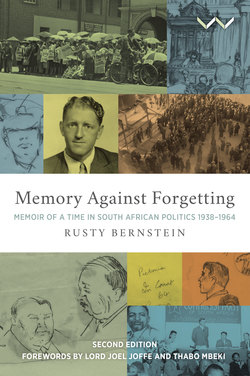Читать книгу Memory Against Forgetting - Rusty Bernstein - Страница 10
На сайте Литреса книга снята с продажи.
ОглавлениеForeword
Thabo Mbeki
May 2017
Having read Memory Against Forgetting, I realise that, quite in error, for many years I thought as a matter of fact that I knew everything I needed to know about many phases of the struggle for the liberation of our country.
This includes much of the period which Rusty Bernstein discusses in this important book.
Thanks to an accident of history I knew and know many of the people he mentions in his account.
I was fortunate that I interacted with some of them in the context of our struggle, as a young cadre involved in that struggle.
In that context it was easy for me casually to address as comrades all these who were, by age and politically, my seniors by a long distance, including Rusty.
When I grew older I came to understand that that political intimacy sometimes served to hide much knowledge about who these people were, who were indeed my comrades.
In these later years I have had direct experience of how some whom I knew attached themselves to the family of those called comrades because this helped them to hide the fact that they were other than comrades.
However, the stories which Rusty tells in this book about himself and his fellow freedom fighters, who, though older, were also my comrades, have greatly assisted me to retreat from my cynicism about the abuse of comrade, the honourable word indicating comradeship.
This is because he writes of himself and these within the context of challenging circumstances which tested their principled loyalty to the struggle as well as comradeship with their comrades.
I speak here of comrades, like Rusty, who stand out today and will, for all time, as legendary figures whose readiness to make all necessary sacrifices brought us the freedom the millions in our country, in Africa, and in the world, continue to celebrate.
Yet it is true that the portraits of these, which Rusty presents with great sensitivity, remain incomplete because they do not and cannot contain the personal details which would complete the composition of the individual as an ordinary human being.
It is in this regard that we are very fortunate that Rusty wrote this book in the way he did.
When I had the opportunity to read it I thought that it would be an account of the struggle, in which Rusty was intimately involved for many decades.
But as I read on I thought that it might be an autobiography.
In the end I discovered that it is both a fascinating story about our struggle, illustrated with telling detail, and an extraordinarily frank narrative about the passions, varied moods and vexations, triumphs and disappointments of an admirable human being and revolutionary.
Because he writes honestly about himself, including as an ordinary human being and a revolutionary, here, finally, I came to possess a true and complete portrait of those I was privileged to address as comrades, who, in terms of age and politically were, as I have said, my seniors by a long distance.
Side by side with that portrait Rusty draws a living picture which tells of his love for his wife, Hilda, and their children, created with the delicate strokes of a master painter.
That moving image helps to present in sharper focus the pains and frustrations and triumphs which accompanied those who dared to engage in the struggle to defeat apartheid tyranny.
The memory so eloquently contained in this book tells especially the younger generations of South Africans who live in freedom that they should never forget that, indeed, that freedom was not free.
